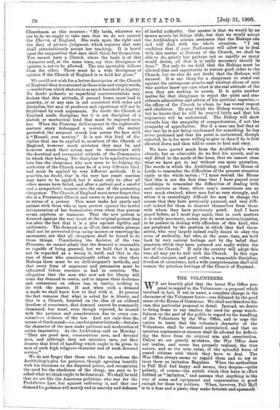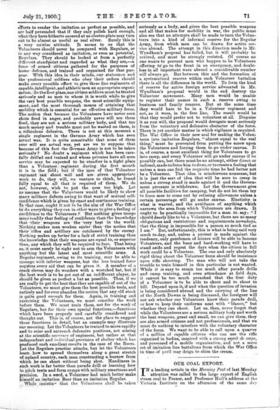THE VOLUNTEERS.
WE are heartily glad that the latest War Office pro- posal in regard to the Volunteers—a proposal which involved in fact, if not in name, a complete change in the character of the Volunteer force—was defeated by the good sense of the House of Commons. We shall not therefore dis- cuss this particular proposal in detail. Instead, we desire to bring home to our readers the need for great watch- fulness on the part of the public in regard to the handling of the Volunteers by the War Office, and to urge the nation to insist that the voluntary character of the Volunteers shall be retained unimpaired, and that no specious arguments or excuses shall be allowed for deflect- ing the force from its original aim and constitution. Unless we are greatly mistaken, the War Office does not realise, and never has properly realised, the true nature, and so the true value, of the splendid force of armed citizens with which they have to deal. The War Office always seems to regard them and to try to treat them as imitation Regulars. When the authorities in Pall Mall feel happy and secure, they despise—quite politely, of course—the article which they have in effect dubbed as "imitation," and assume that anything in the way of arms and equipment and organisation is good enough for these toy soldiers. When, however, Pall Mall is in a fuss and a panic, they make feverish and spasmodi efforts to render the imitation as perfect as possible, and are half persuaded that if they only polish hard enough, what they have hitherto sneered at as electro-plate may turn out to be almost as useful as real silver. Surely this is a very unwise attitude. It seems to us that the Volunteers should never be compared with Regulars, or in any way considered as imitation, or even as potential, Regulars. They should be looked at from a perfectly different standpoint and regarded as what they are,—a force of armed citizens gathered for the purposes of home defence, and trained and organised for that pur- pose. With this idea in their minds, our statesmen and the professional soldiers who obey their orders should make every possible effort to give these fine regiments of capable, intelligent, and athletic men an appropriate organi- sation. -In the first place,our citizen soldiers must be treated seriously and as men to whom it is worth while to give the very best possible weapons, the most scientific equip- ;tent, and the most thorough means of attaining that mobility which is essential for an effective military force. The notion that because the Volunteers have never seen shots fired in anger, and probably never will see them fired, they are not a serious military body, and that -too much money and trouble must not be wasted on them, is a. ridiculous delusion. There is not at this moment a single regiment in the German Army which has seen actual war. It is quite conceivable that none of them ever will see actual war, yet are we to suppose that because of this fact the German Army is not to be taken seriously ? No doubt a regiment which has been care- fully drilled and trained and whose privates have all seen service may he expected to be steadier in a tight place than a Volunteer -regiment during the first month it is in the field; but if the men of that Volunteer regiment -call shoot well and are given appropriate work to do, they will, we venture to think, be found fully equal to all that is required of them. We do not, however, wish to put the case too high. Let us assume that the Volunteers would be likely to show many military defects owing to that want of mutual self- confidence which is given by exact and continuous training. In that case, ought it. not to be the aim of the War Office to do everything they can in other ways to give a feeling of eonfldence to the Volunteers ? But nothing gives troops more readily that feeling of confidence than the knowledge that their _weapons are the -very best in the world. Nothing makes men weaken easier than the notion that their rifles and artillery are outclassed by the enemy. Nothing makes up better for a lack of strict training than the knowledge that their weapons are equal to, or superior than, any which they will be required to face. That being so, it must surely be right not to arm the Volunteers with anything but the latest and most scientific arms. A Regular regiment, owing to its training, may be able to manage with inferior weapons, but the less trained force requires every aid that can be given it. A member of a crack eleven may do wonders with a wretched bat, but if the best work is to be got out of an indifferent player, he should be given as perfect a bat as possible. Thus, if we are really to get the best that they are capable of out of the Volunteers, we must give them the best possible tools, and entirely and for ever abandon the notion that any old stock is quite good enough for them. Again, in training and exercising the Volunteers, we must consider the work before them. We must train them, not for the work of Regulars, but for their own special functions,—functions which have been properly and carefully considered -and thought out. This is, of course, not the place to suggest these functions in detail, but an example may illustrate our meaning. Let the Volunteers be trained to move rapidly and to seize and entrench defensive positions, not aiming at the scientific acciiraey of engineers, but rather at that independent and individual provision of shelter which has produced such excellent results in the case of the Boers. Let the Regulars practise attacks, but let the Volunteers learn how to spread themselves along a great stretch of upland country, each man constructing a burrow from which he can shoot without being shot. Handiness in such work is far better than parade drill or learning how to pitch tents and form camps with military smartness and precision. In a word, a Volunteer had much better make himself an imitation Boer than an imitation Regular.
. While insistine. that the Volunteers shall be taken seriously as a body, and given the best possible weapons and all that makes for mobility in war, the public must. also see that no attempts shall be made to turn the Volun- teers into a kind of informal reserve for the Regular Army, from which men can be drawn for active ser- vice abroad. The attempt in this direction made in Mr. Wyndham's proposal has failed, but it will probably be revived, and must be strongly resisted. Of course no one wants to prevent men who happen to be Volunteers offering to' go to the front in an emergency, and doubt- less in all important wars abroad a considerable number will always go. But between this and the formation of a systematised reserve within each Volunteer battalion there is all the difference in the world. To form the kind of reserve for active foreign service advocated in Mr. Wyndham's proposal would in the end destroy the Volunteer movement. Many men would be unable to register their names in such a reserve owing to business and family reasons. But at the same time they would hate to be in a Volunteer regiment and not, as it were, in the first line. The result would be that they would prefer not to volunteer at all. Disguise it as you will, the proposal would derogate most seriously from the voluntary and defensive character of the force. There is yet another matter in which vigilance is required. The War Office in their new zeal for making the Voluns teers into imitation Regulars, "almost equal to the real thing," must be prevented from putting the screw upon the Volunteers and forcing them to go under canvas. It is, of course, a most excellent thing for Volunteers to go into camp, and every Volunteer will go under canvas if be possibly can, but there must be no attempt, either direct or indirect, made to force him to do so, or to create a feeling that unless a man can find the requisite time he had better not be a Volunteer. That idea is mischievous nonsense, but it is just the sort of idea that will be sure to creep in unless a strong stand is made against it and the Govern- ment pressure is withdrawn: Let the Government give all possible facilities for camping, but do not let them try to force men to come out by refusing allowances unless a certain percentage will go under canvas. Elasticity is what is wanted, and the avoidance of anything which narrows the area from which Volunteers are drawn. It ought to be practically impossible for a man to say: "I should dearly like to be a Volunteer, but there are so many obligations and restrictions and requirements nowadays, that the thing is impossible for a person so much tied as I am." But, unfortunately, this is what is being said very much to-day, and, unless a protest is made against the tendency, only gentlemen of leisure will be able to become Volunteers, and the busy and hard-working will have to stand aside and regret the days when the citizen in full work could be a, Volunteer. The one and only absolutely rigid thing about the Volunteer force should be insistence upon rifle shooting. The man who will not take the trouble to train himself in this particular is not wanted. While it is easy to strain too much after parade drills and camp training, and even attendance at field days, it cannot be too much preached that the first duty of a Volunteer is to be able to shoot and to shoot to kill. Depend upon it, if and when the question of invasion is being considered abroad and the carrying of the line of the North Downs is being discussed, the foreigner a ill not ask whether our Volunteers know their parade drill, or how to keep their uniforms neat with " blanco," but whether they can shoot. Let us, then, never forget that while the Volunteers are a serious military body and worth the best weapons, great and small, we can give them, they are also armed citizens and not professionals, and that we must do nothing to interfere with the voluntary character of the force. We want to be able to call upon a quarter of a million of capable citizens who can use the rifle organised in bodies, inspired with a strong esprit de corps, and possessed of a mobile organisation, and not a mere set of imitation line battalions from which the War Office in time of peril may deign to skim the cream.



































 Previous page
Previous page